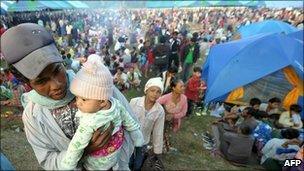Pro-military party 'wins' Burmese election
- Published

Fighting between ethnic rebels and government soldiers has caused at least 20,000 Burmese to flee
Burma's main military-backed political party says it won about 80% of votes in the first election in 20 years.
A Union Solidarity and Development Party (USDP) official said the party was pleased with the result.
The main pro-democracy party, the NLD, boycotted the poll but other opposition groups have alleged widespread fraud.
China praised the ruling generals for the vote, which marked a "transition to an elected government". But the poll has been widely condemned as a sham.
"This is a critical step for Myanmar (Burma) in implementing the seven-step road map in the transition to an elected government, and thus is welcome," said foreign ministry spokesman Hong Lei.
He said the vote was carried out in a "steady and smooth manner".
The poll is the first in Burma since 1990, when Aung San Suu Kyi's National League for Democracy party secured an overwhelming victory but was never allowed to take power.
The junta says the election marks the transition from military rule to a civilian democracy.
UN Secretary General Ban Ki-moon has described it as insufficiently inclusive and transparent. Many Western governments say the election was neither free nor fair.
Despite this, some analysts say that - although deeply flawed - the election could mark the start of a process of democratisation, by giving opposition lawmakers a voice, however limited, in the institutional decision-making process.
Persecution
Hundreds of Burmese are making their way home after clashes on the Thai border
The election has sparked fierce fighting in the east of the country between ethnic Karen rebels and government forces, driving an estimated 20,000 people across the border into Thailand.
Residents in the town of Myawaddy said Burmese troops have now pushed back the rebels, who stormed government buildings on Sunday to protest against the election.
Thai officials at the border have declared the northern area of Myawaddy as safe. There are reports of hundreds of Burmese making their way home.
However, thousands more remain in the emergency shelters set up in the Thai border town of Mae Sot.
There are rumours that the Karen rebels are regrouping in the jungle.
"People are scared to go back as they don't really know what's going to happen," a Burmese resident in Mae Sot told the BBC.
Meanwhile, Burmese troops are reportedly trying to dislodge ethnic Karen fighters from around the Three Pagodas Pass, which lies further south. There are reports of gunfire.
A faction of the Democratic Karen Buddhist Army (DKBA) occupied a police station and polling booth in Myawaddy as a show of opposition to the government's plan to incorporate ethnic armies into a centrally controlled border force.
Ethnic groups in Burma have been demanding - without success - greater regional autonomy from the majority Burman-led central government since independence from Britain in 1948. Many have suffered persecution at the hands of the government.
'Victory'
It remains unclear when any official result will be announced.
Pro-democracy opposition groups have made claims of fraud in the counting of votes in Sunday's election.
At least six political parties have made formal complaints to the Election Commission, citing the practice of advance voting, in which government workers - civil servants and soldiers - were escorted to polling booths in the days before the poll.
"We took the lead at the beginning but the USDP later came up with so-called advance votes and that changed the results completely, so we lost," Khin Maung Swe, leader of the National Democratic Force, the largest opposition party, told Reuters.
Other opposition figures earlier told BBC Burmese that while they had won at the polling stations - where a first count of ballots was sealed - they later lost at the Commission.
Voters were electing candidates to a two-chamber parliament and 14 regional assemblies.
More than two-thirds of the 3,000 candidates were running for two parties closely linked to the military junta.
The USDP is closely aligned with the head of the Burmese military government, Gen Than Shwe. Dozens of senior officers had recently "retired" to stand for the party.
The constitution, which was written by the ruling generals, reserves more than a quarter of seats in the new parliament for the army.
The combined force of these two groups is likely to mean that they have an effective veto over legislation.
More than 2,000 political prisoners and thousands of ethnic minority citizens were no allowed to take part.